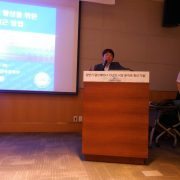OLED Highly Polarized OLED, A New Approach to Improve OLED Light Efficiency,
Professor Kim Jae-Hoon of Hanyang University announced at the seminar, ‘OLED market analysis and latest technology’ for the first half, host by UBI industry research last June that a small amount of chiral molecule added to the polymer OLED emissive layer controls the polarization of light emission to improve light efficiency by 60%.

Two linear polarizers applied in orthogonal form to LCD are used to transmit or block the light from the back light unit through liquid crystal movement while one circular polarizer of OLED prevents reflection of external light, which is applied as a role to increase outdoor visibility
Display companies have focused on development of device structure, optical extraction technology and material, and luminescent mechanism to compensate for more than 50% luminescent light loss due to the polarizer. We need a way to improve the efficiency of OLED using polarized light. Professor Kim, Jae-hoon has presented a method and research results to improve the OLED light efficiency in use of polarized light, emphasizing ‘the need of a new approach in a new perspective’.

<Simulation of chiral molecules-added OLED structure>
Professor Kim, Jae-hoon explained, ‘Polymer materials of OLED generate high linearly polarized light with high liquid crystallinity in general. When this light passes through a light emitting layer inclusive of chiral molecules, it becomes a circularly polarized light’. “Theoretically, the light efficiency can be increased by 100%,” he added. “This way, we can implement brighter OLED with lower power consumption.”
In application of this principle, Professor Kim, Jae – hoon and his team members have developed the OLED with luminous efficiency 60% higher than existing OLED and further research will be continued on circular polarization based on low molecular materials.
Meanwhile, the research was sponsored by the ‘Future Display Core Technology Development’ project, and the research outcomes have been published in the recent issue of an international journal, ‘Advanced Materials’.

